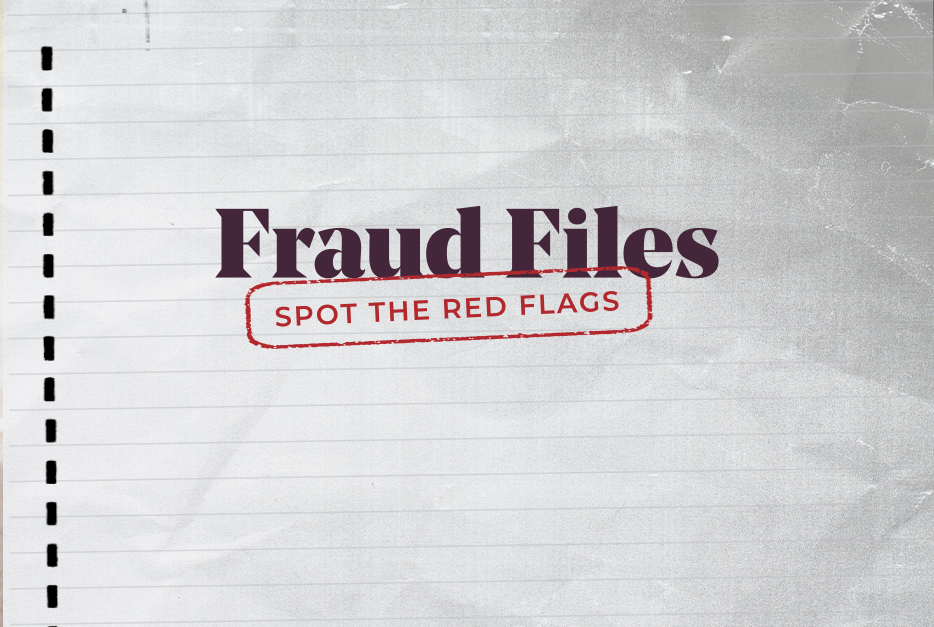Avoiding fraud in today's digital world
Whether it was William McCloundy, known as I.O.U. O'Brien, who sold the Brooklyn Bridge in 1901 to a tourist, Charles Ponzi, father of the Ponzi scheme, or today's elusive cybercriminals, the end goal is to take advantage of unsuspecting victims.
It's not surprising that as we all spend more time within the digital world, fraudsters have turned their attention to using today's most common means of information gathering and communication to set their trap. It's easy to read something and believe that it could never happen to you, but there's a good chance that it will happen to you or someone close to you.
But remember, scammers can't make money off those who are educated, know what to look out for, and how to protect themselves from fraud.
Educate yourself
Spoofing is when a fraud site impersonates or spoofs legitimate businesses and tricks unsuspecting people into divulging personal information. Spoofing can take many forms, but in the end, all want you to disclose sensitive information such as passwords, credit card numbers, and bank account information.
-
Phishing: This occurs when contact is made through an unsolicited email that claims to be legitimate. Often the email requests that you verify information either through an email or via a web link.
-
Smishing: The same as phishing but done through text messages.
-
Vishing: Many of us are exposed to vishing every day when the phone rings, as vishing is phishing by voice, using the phone to manipulate people into providing information. Often the bait is a free offer, prize or vacation that you've won. But to collect your freebie, you must first send information or money.
-
Search engine phishing: Is when a website is created that offers cheap products or amazing deals to get it indexed by legitimate search engines appearing in the top of search engine result
- Angler Phishing: Social media offers many ways for criminals to trick people. Fake URLs, cloned websites, posts, and tweets can all be used to persuade people to divulge sensitive information or download malware. Scammers can also create fake online customer support personas to try and persuade you to commit the requested action.
Online advertising fraud has been relatively easy and lucrative for fraudsters, difficult for online ad platforms to control, and a financial burden for victims and legitimate advertisers. It’s important to use the internet safely and be skeptical. If it seems too good to be true, then it probably is.
Tips to spot fraud and prevent becoming its next victim
- Don't reply to emails asking for personal information to stop the sudden closure of an account. Do not click on links within the email. Instead, open a new browser window and type in a web address you can confirm to reach the company in the email, or call the company instead.
-
Be skeptical. Legitimate businesses don't send unsolicited requests for personal, sensitive, or financial information through email, texts, or phone.
-
Don't open attachments, follow links, or reply to spam messages — even to unsubscribe.
-
Look for a "lock" icon at the bottom of your browser and make sure "https" appears in front of the Web address before submitting any personal or financial information through a web site. These visual clues tell you the information you are sending is secure.
-
Verify links before clicking on them by hovering your mouse over the link and carefully checking that it's the website that you expect. The difference may be as simple as a .net address versus a .com address, or a slight difference in spelling, so pay close attention.
-
Be skeptical of emails, messages, or websites containing misspelled common words; grammar errors that make it difficult to understand or misuse common expressions.
-
Google Ads show the destination website address near the ad headline. Confirm this link is what you expect before clicking, and if unsure, don't click the link.
-
When possible, go to the source directly, and type in the company website yourself to verify and use the information from the website.
-
Don't answer phone calls from unknown numbers. If you do answer, remember these criminals want to frighten you and play on your emotions. Don't be afraid to hang up and if you're still worried, and call the organization directly to confirm.
- Keep your anti-virus software updated on all your devices.
Visit our fraud prevention centre to learn how to protect yourself:



